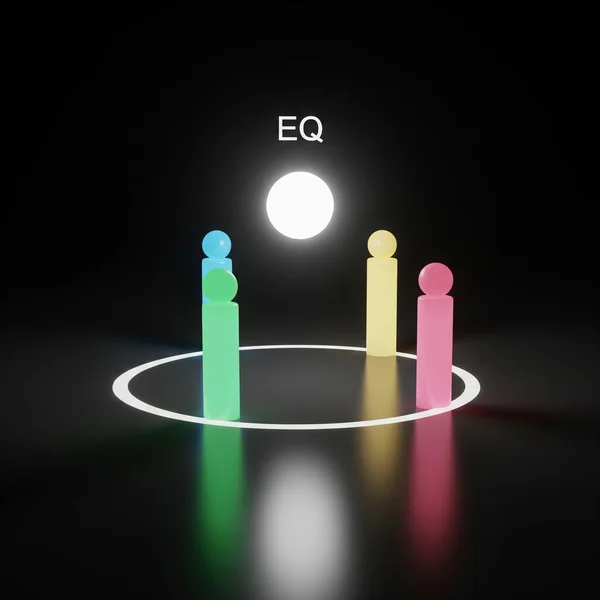What Is an EQ Test? A Beginner's Guide
July 6, 2025 | By Isla Caldwell
Have you ever wondered why some people navigate tense social situations with ease, while others struggle? Or why certain colleagues seem to stay calm under immense pressure? The answer often lies not in their intelligence quotient (IQ), but in their emotional quotient (EQ). But what is an EQ test, and how can it be the key to unlocking your own potential? It's a powerful tool for self-discovery, and you can begin this journey with a comprehensive EQ assessment designed to provide you with meaningful insights.
First, What Is Emotional Intelligence (EQ)?
Before we dive into the test itself, it's crucial to understand what we're measuring. Emotional Intelligence (EQ) is the ability to perceive, use, understand, manage, and handle emotions. It's about recognizing your own feelings and those of others, using this awareness to manage your behavior and relationships effectively. Think of it as the "street smarts" of your emotional world. So, what does an EQ test measure in practical terms? It assesses how well you can turn emotional awareness into effective action.
The Key Difference Between EQ and IQ
For a long time, IQ was seen as the primary determinant of success. We now know that's only half the story.
-
IQ (Intelligence Quotient): Measures your cognitive abilities, like logic, reasoning, and learning capacity. It's often considered relatively stable throughout life.
-
EQ (Emotional Quotient): Measures your ability to manage emotions. The great news is that your emotional intelligence is not fixed; it's a flexible set of skills that you can learn and improve over time.

Why EQ Matters in Your Daily Life
A high level of emotional intelligence impacts nearly every facet of your life. It helps you build stronger relationships, make better decisions, and achieve greater success at work. From navigating team dynamics to handling personal stress, a well-developed EQ is an invaluable asset for your personal growth.
So, What Is an EQ Test Exactly?
An emotional intelligence test is a psychometric assessment designed to measure your abilities across the different facets of EQ. Unlike a history exam with right or wrong answers, an EQ test uses situational questions to gauge how you typically respond to various real-life scenarios. Who should take an EQ test? Anyone looking to better understand themselves and enhance their interactions with the world.
The Goal of an EQ Assessment
The primary goal is not to label you or give you a score you're stuck with forever. Instead, the objective of a quality emotional intelligence test is to provide a clear, objective snapshot of your current emotional skills. It identifies your strengths and, more importantly, highlights the areas where you have the greatest opportunity for growth.
It's Not a Pass-or-Fail Exam
Let's be clear: you cannot "fail" an EQ test. It is a tool for self-discovery, not a judgment of your worth. Every result is a data point that empowers you to take conscious steps toward becoming a more emotionally intelligent individual. A reliable eq test simply provides the map; you decide the direction of your journey.
What Does an Emotional Intelligence Test Measure?
A comprehensive EQ test doesn't just give you a single number. It breaks down your emotional intelligence into several core competencies, giving you a much more nuanced understanding of your profile. Our test focuses on four critical pillars:

Self-Awareness: Understanding Your Own Emotions
This is the foundation of EQ. It’s your ability to recognize your own emotions as they happen and understand your tendencies. Do you know what triggers your stress or joy? High self-awareness means you have a clear picture of your emotional landscape.
Emotional Regulation: Managing Your Feelings
Once you're aware of your emotions, how do you handle them? Emotional regulation is about controlling your impulses, managing stress in healthy ways, and staying adaptable in the face of change. It's the difference between a reactive outburst and a thoughtful response.
Empathy: Recognizing Emotions in Others
This component is about social awareness. Empathy is the skill of understanding the needs, feelings, and concerns of other people. It allows you to see things from their perspective, which is crucial for effective communication and building strong bonds.
Social Skills: Building Strong Relationships
This is where EQ becomes action. Strong social skills involve using your awareness of your own emotions and those of others to manage relationships successfully. This includes clear communication, influence, conflict management, and teamwork.
Who Should Take an EQ Test?
The short answer? Everyone. Because emotional intelligence is a universal skill, an EQ assessment offers valuable insights for people from all walks of life.
For Personal Growth and Self-Discovery
If you're on a journey to better understand yourself, an EQ test is an excellent starting point. It can illuminate blind spots in your behavior and provide a concrete framework for how to improve eq.
For Professionals and Leaders
In the workplace, EQ is a superpower. It boosts leadership ability, improves teamwork, and helps in navigating complex office politics. For professionals, taking an eq test online can be the first step towards becoming a more effective and respected colleague or manager.
For Students Navigating Academic Life
The pressures of school, social life, and planning for the future can be emotionally demanding. An EQ test can help students develop resilience, manage stress, and build the interpersonal skills necessary for success both in and out of the classroom.
Your First Step to Higher Emotional Intelligence
Understanding what an EQ test is and what it measures is the first crucial step. It's not just another online quiz; it's a scientifically-backed mirror that reflects your ability to navigate the complex emotional currents of life. It provides the awareness you need to begin a meaningful journey of growth. The insights you gain are the foundation upon which you can build stronger relationships, a more fulfilling career, and a greater sense of personal well-being.
Ready to take that first step?
Take Our Free, Science-Backed EQ Test Now!

Frequently Asked Questions about EQ Tests
Are EQ tests scientifically accurate?
The accuracy of an EQ test depends heavily on its design. High-quality tests, developed based on established psychological models of emotional intelligence, are reliable tools for self-assessment. They provide valuable indicators of your emotional competencies, though they should be seen as a starting point for reflection, not a definitive clinical diagnosis.
How long does a typical EQ test take?
Most well-designed online EQ tests take between 10 to 15 minutes to complete. This is long enough to gather sufficient information for a meaningful analysis but short enough to easily fit into your busy schedule.
Can I improve my EQ score?
Absolutely! This is one of the most exciting things about emotional intelligence. Unlike some fixed traits, EQ is a set of skills that can be actively learned, practiced, and improved over time with conscious effort. A test simply gives you a baseline to work from.
Is there a free EQ test I can trust?
Yes, but it's important to choose wisely. A trustworthy test is transparent about what it measures and is based on recognized psychological theories. We offer a free eq test designed to give you a comprehensive and reliable starting point for understanding and improving your emotional intelligence.